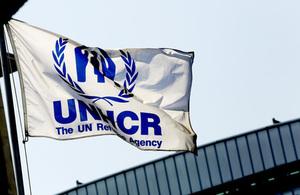UK Statement on the Comprehensive Refugee Response Framework
This statement was delivered at the Office of the United Nations High Commissioner for Refugees in Geneva on 10 July 2017.

UNHCR is headquartered in Geneva
The UK strongly supports what has been said about the importance of implementing new ways of working to respond to protracted crises. Of doing all we can to address the root causes of these crises. And recognising that this is a shared challenge for the international community.
As we have heard, displaced people need more than basic protection and support - vital as that is. They need to be allowed to maintain dignity through education, employment and self-sufficiency. They need hope for the future.
That is why the UK:
- commends the huge efforts of host countries in supporting refugee and displaced populations
- believes the international community must support these countries better and move beyond just life-saving assistance to investments in jobs, education and services, and support for economic development in host countries
- firmly reinforces the right to protection for individuals fleeing conflict, violence or persecution at the first opportunity.
- acknowledges the importance of durable solutions for displaced people The Comprehensive Refugee Response Framework (CRRF) provides an effective tool to evaluate existing practices and pilot new approaches. It must become the central tenet of the new Refugee Compact.
We will continue to support UNHCR to facilitate as inclusive process as they can in mobilising the CRRF, allowing national governments to lead as much as possible.
The UK will also continue to deliver on its commitment to support refugees and the nations that accommodate them, including through:
- providing 0.7% of our GNI on international aid, over £13 billion in 2016
- spending at least half of this aid on fragile states and regions
- resettling 20,000 refugees through the Syria Vulnerable Persons Resettlement Scheme and 3,000 of the most vulnerable children and family members from the MENA region by 2020. This is in addition to other resettlement programmes and the thousands who receive protection in the UK under normal asylum procedures. I am also pleased to say last week we expanded the scope of the Syrian resettlement scheme to make it accessible to the most vulnerable refugees who have fled the Syrian conflict, regardless of their nationality.
Looking ahead, the case studies today show the importance of:
- first, planning early and for the long-term, including through multi-year programmes that support Governments to make the long-term investments and reforms needed
- second, we should use development aid whenever possible and humanitarian aid only when necessary. This means focusing on inclusion, jobs, education and livelihoods and breaking down traditional development and humanitarian siloes. Enhancing economic and trade opportunities for host countries. While providing humanitarian support in line with humanitarian principles
- third, we must learn from good practice. New approaches are being implemented. UNHCR have an important role to facilitate lessons learned from the CRRF pilots
The UK will continue to play its part in both pressing for – and delivering – the new comprehensive approaches required. The refugee compact is an excellent opportunity to cement the good practice and principles we have established, especially from the CRRF, and set the way for more effective future responses.